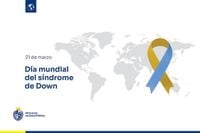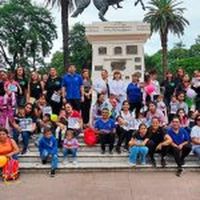Every year on March 21, the world comes together to recognize and celebrate World Down Syndrome Day, an occasion not only to raise awareness about the condition but to honor the unique contributions of individuals with Down syndrome to their communities. This year marks the 2025 observance, with the theme, "Improve Support Systems for People with Down Syndrome." This theme emphasizes the need for adequate support mechanisms that allow individuals to attain their rights and dignity within society.
Established by the United Nations General Assembly in 2011, World Down Syndrome Day is celebrated on March 21, a date that signifies the trisomy of the 21st chromosome—a genetic condition affecting about 1 in every 691 births. This genetic anomaly occurs due to the presence of an extra chromosome, resulting in physical and cognitive differences that can vary from person to person. Contrary to the common misconception, Down syndrome is not a disease but a lifelong condition that can be managed through early intervention and tailored support.
The early years of children with Down syndrome are particularly crucial. As noted by experts at the DIF (National System for Integral Family Development), timely assistance can enhance a child's potential dramatically. "Intervention should ideally occur within the first days of life. The difference between early support and late intervention can significantly impact their developmental trajectory," they assert.
On this occasion, communities around the globe engage in various activities to promote awareness and celebrate diversity. In San Miguel de Tucumán, Argentina, a symbolic walk took place in San Martin Square, organized by the Early Stimulation Center at the Hospital de Niño Jesús in collaboration with local education and health authorities. Dr. Inés Gramajo, director of the hospital, highlighted the importance of family involvement in these initiatives. "The widespread participation underscores the commitment of families to support their children. We aim for them to integrate into society from early childhood," she remarked.
The early stimulation center has been part of the hospital for more than 35 years and adopts a collaborative model between health and education sectors. The center's team, consisting of therapists, physiotherapists, speech therapists, and other specialists work together to provide care for children aged 0 to 3 years and 11 months. Their goal is not only to ensure the ideal development of children with Down syndrome but also to facilitate their inclusion in educational and social settings.
In another display of community spirit, the campaign promoting mismatched socks was highlighted—an initiative by the International Down Syndrome Association (DSI). The act of wearing odd socks is intended to symbolize the celebration of differences, showing the vibrant diversity in the world. This playful yet profound gesture originated in 2015 and gained momentum in 2018 after a British girl, Chloe Lennon, posted a video inviting everyone to join the movement. This year, many will wear vibrant and mismatched socks to show their support and solidarity with individuals with Down syndrome.
In addition to the celebrations, the day serves as a critical reminder of the challenges faced by people with Down syndrome. Data from Uruguay indicates that between 2019 and 2023, there were 109 births of babies with Down syndrome, with 64% of mothers being 35 years of age or older. This data highlights the significance of early diagnosis and intervention, as early and ongoing support can significantly improve the quality of life and longevity for individuals with Down syndrome.
Individuals with Down syndrome often face a higher risk of certain medical issues, including malformations, respiratory problems, and leukemia. However, with the right support systems in place, many can lead fulfilling lives. The emphasis on inclusion and rights assures that children with Down syndrome have the opportunity to access early intervention services and rehabilitation therapies, essential for their development.
World Down Syndrome Day is a collective call to action. It is about advocating for policies that create equitable opportunities for individuals with disabilities, securing their rights in education, healthcare, and employment. As the festivities continue, let us remember the necessity of tearing down barriers that hinder individuals with Down syndrome from reaching their full potential.
In conclusion, while we celebrate the achievements and unique qualities of individuals with Down syndrome, we also reaffirm our commitment to improving their support systems. The journey towards equality is far from over. Discussions about policies and frameworks need to continue, ensuring every individual is afforded dignity and respect.








